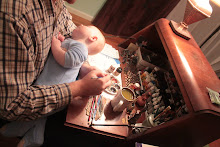Second, thinking a bit about the role of the cleric in classic D&D games. I had a very vivid dream last night that featured children's books, the title of one of which was St. Sebastian and the Water of Life. Not knowing anything about St. Sebastian, I of course headed to Wikipedia. That lead me to reading about military saints. If you think about it, a religious person would be pretty common in a dark ages type setting, particularly if you count those who merely labor as lay persons for the church. Priests would be slightly less common, and true clerics in the D&D sense, who can cast "spells", or otherwise more directly interact with a deity would be uncommon indeed. This person might be seen as a sort of military saint, someone who was/is a military person, but has a religious calling as well.
Bat in the Attic has a couple of posts talking about just this sort of demographics, and comes up with the following numbers:
- 1 non-spell casting clergy per 40 people
- 1 leveled (spell casting) cleric per 1000 people.
This also leads one to consider the role of an Ignatius, a famous cleric who founds an order of clerics. Would that not allow for both opportunity and restraint on the actions of the player character? No longer would they be a wandering lonely cleric, but now they are members of an order, and would gain both the benefits (equipment, support) and the drawbacks that entails (obedience, poverty etc.)
What do you think?
[for much more on Christianity, and its expression in D&D, see the fine blog Blood of Prokopius]


No comments:
Post a Comment